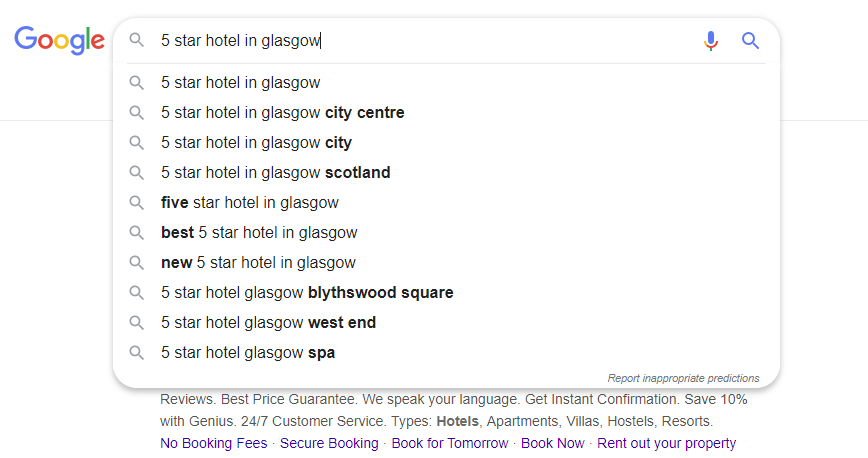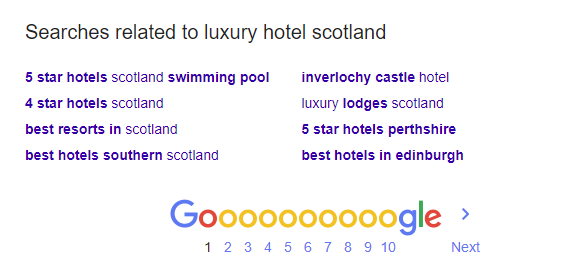Keyword research is an incredibly important - if not, the most important - part of your SEO strategy.
Choose the wrong keywords and you’ll struggle to get eyeballs on your content and customers through your digital doors.
Why carry out keyword research?
Carrying out keyword research gives you the chance to get a deeper understanding of the people you’re targeting and how they are searching for your content, services, and products.
It essentially gives you the information and data you need to answer questions like:
- What are people searching for?
- How many people are searching for it?
- In what format do people want that information?
On top of this, keyword research also helps you get to the bottom of the thoughts, struggles, and dreams of your target market which you need to know to create irresistible content.
This also helps you to uncover the search volumes for a particular keyword in order to know if it’s useful for your audience. You can find that data with a tool like Google Search Console where you can see the keywords your website is ranking for, its average position, the number of searches it gets, and how many clicks were generated during a certain timeframe.
For example, let’s say your website is in eighth position for a keyword you want to rank for. This keyword had 10,000 impressions last month, but only 80 people clicked through (that’s a pretty dismal 0.8% click through rate if you do the maths).
You can use this data to decide if you want to continue to focus on this keyword or determine what the competition is for that search term so you can plan a strategy to get ahead.
But first things first, how do you get started with keyword research?
Brain dump keywords that relate to your business
You probably already have an idea of at least a few keywords that people are searching for that relate to your business. These might be words that hint at your products, services, and key topics that your business aligns with.
This is a great place to start.
Simply grab a piece of paper (or a digital document) and begin to list out anything that comes to mind.
You can even create a mindmap of keywords that relate to other keywords. At this point, you really want to just get everything down that you can; you can always hone and refine later.
For example, if you’re a five star hotel, you might list out things like:
- Luxury hotel in [location]
- 5 star hotel in [location]
- Spa hotel
- Luxury break
- Romantic break
You can then enter these keywords into a keyword research tool (which we’ll talk more about in a minute) to see how many people are searching for those terms.
It usually works out that the more people that search for a keyword, the more work is required to rank higher in the search engines. That's because your competitors are probably already ahead of the game and trying to capture as much of that traffic for themselves.
You will probably find that the keywords you list out in this part of the research process are pretty competitive and broad. There are a couple of quick and easy ways you can get more narrow keyword choices.
1. Google and YouTube suggest
Head over to Google and type one of your main keywords into the search bar and then see what pops up in the dropdown menu. You can do the same on YouTube. This gives you an idea of the most popular topics people are searching for when they type in your keyword.

2. Related searches content
Google also offers another handy dose of inspiration. Type in your keyword and then scroll to the bottom of the search results to see what’s listed in the “searches related” section.

Long tail keywords
It would be great to rank for the search term “bags”, right? Or would it?
Sure, this keyword gets hundreds of searches a month, but the intent of the people searching for it can vary massively.
One person might be looking for a particular bag, another might be wanting to see what the latest trends are, while others are probably just browsing.
However, someone who searches for “cheap leather bags with hand embroidery” practically has their credit card out and ready to buy.
While broader search terms can capture more people in general, you might find that most of those people have goals that don’t match the content your page provides.
Competitor keywords
Checking out what keywords your competitors are using and ranking for is another great way to carry out research.
You have two options here:
- You can prioritise high-volume keywords that none of your competitors are currently ranking for and swoop in on their missed opportunities.
- You can prioritise the keywords your competitors are already ranking for to compete with them (and steal their audience).
Keyword research tools
Now you’ve got a huge list of potential keywords, it’s time to run them through a keyword tool to determine which ones you should focus on. Ideally, you want to aim for keywords that have a relatively high search volume but low competition.
Top free tools include Google Keyword Planner, Ubersuggest, and Keywords Everywhere.
Choosing the right keywords is a pivotal part of your SEO strategy, so it’s worth spending time researching all your options so you can get it right first time.
